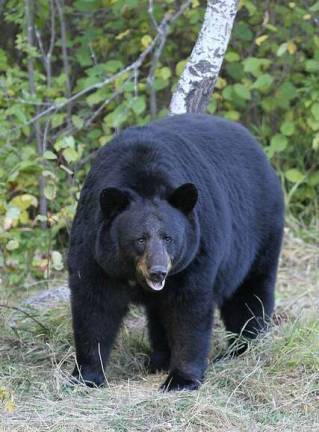TRENTON (AP) ‑‑ New Jersey's bear hunt continues after getting off to a slow start.
Preliminary figures show hunters killed 26 bears on Monday, Oct. 9, mainly in Sussex County. That compares to 206 that were killed on the first day of the hunt in 2016.
Opponents say the hunts are inhumane and unnecessary.
According to a report in NJ.com, two anti-hunt activists were arrested this week at the Whittingham Wildlife Management Area check station in Sussex County.
The six-day hunt started at sunrise in eight counties. The first three days are reserved for bow hunting, while both hunting with bows and muzzle-loading guns will be allowed during the last three days.
Segment B, a firearms-only season segment, will be held Dec. 4 through Dec. 9 if the harvest rate remains within acceptable limits by the close of next week’s season segment.
State parks and wildlife management areas are open to hunting in Hunterdon, Morris, Sussex and Warren counties, and in areas of Bergen, Mercer, Passaic and Somerset counties.
In 2016, hunters harvested a total of 636 bears during the two season segments, with 562 taken during the October segment.
State wildlife officials say the hunts help control the black bear population and minimize run-ins with humans.
“Black bears are an important part of our natural ecosystem,” said Division of Fish and Wildlife Director Larry Herrighty. “Closely managed hunting is a key component of the state’s comprehensive approach for maintaining a sustainable bear population while reducing the potential for property damage and encounters with people.”
In addition to hunting, the state’s Comprehensive Black Bear Management Policy, approved by the New Jersey Fish and Game Council and the Department of Environmental Protection, emphasizes public education and research to reduce the potential for conflicts between bears and people in the nation’s most densely populated state.
“Based on our returns of tagged bears, we know that hunting results in the harvest of bears that have become habituated to people,” Herrighty said. “Notably, since the addition of the October hunt in 2016, overall bear complaints have dropped 55 percent, and Category 1 complaints involving encounters that present the greatest potential for someone to be hurt have dropped 65 percent.”
Some information for this report came from the state Department of Enviromental Protection's Division of Fish & Wildlife.
For more information visit: http://www.njfishandwildlife.com/bearseason_info.htm
